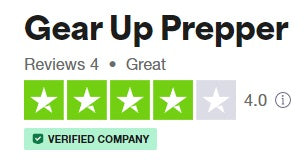In today's rapidly evolving world, where uncertainties abound and unexpected events can swiftly disrupt lives, the importance of being prepared for emergencies cannot be overstated. Whether it's the looming threat of natural disasters like hurricanes and earthquakes or the unsettling specter of global conflicts such as the Russia-Ukraine crisis, having a well-thought-out emergency plan and the necessary supplies can make all the difference between safety and vulnerability. While the idea of emergency preparation may initially seem daunting, with the right knowledge and approach, anyone can take the vital first steps toward safeguarding themselves and their loved ones.
Assess Your Risks:
At the heart of effective emergency preparation lies a thorough understanding of the specific risks and hazards that may affect your locality. Begin by conducting comprehensive research into potential threats, ranging from natural calamities to man-made emergencies, drawing on historical data and insights from local government resources. Consider various factors such as geographical location, prevalent climate patterns, and proximity to critical infrastructure. Additionally, take into account any personal circumstances, such as medical conditions or disabilities, that could impact your preparedness plan.
Create a Basic Emergency Plan:
Armed with insights into the risks you face, it's time to craft a comprehensive emergency plan tailored to your family's needs. This plan should delineate clear protocols for communication, evacuation, and reunification in the event of an emergency. Identify primary and alternative evacuation routes, nearby emergency shelters, and designated safe meeting places in your vicinity. Assign specific roles and responsibilities to each family member based on their individual capabilities and strengths. Regularly conduct drills and simulations to ensure that every member of your household is prepared to respond promptly and effectively in times of crisis.
Build an Emergency Kit:
A well-equipped emergency kit forms the cornerstone of preparedness, providing essential supplies to sustain you and your family during critical moments. Stock your kit with items that can support you for at least 72 hours, including water, non-perishable food items, a comprehensive first aid kit, flashlights, batteries, a multi-tool, essential medications, and copies of important documents. Customize your kit to cater to the specific needs of your family, whether it involves medications, pet supplies, or infant care items. Store your emergency kit in a designated location that is easily accessible to all family members and ensure it remains regularly updated.
Learn Basic Survival Skills:
In addition to acquiring the necessary supplies, acquiring fundamental survival skills is paramount to effectively navigating through emergencies. Familiarize yourself with essential first aid techniques, such as CPR and wound care, enabling you to address injuries and medical emergencies swiftly and effectively. Equip yourself with basic navigation skills, including the use of a compass and map reading, to navigate unfamiliar terrain with confidence. Practice basic fire safety measures and acquaint yourself with the operation of emergency tools and equipment, empowering you to respond decisively in crisis situations.
Stay Informed:
Remaining abreast of potential threats and hazards is crucial for staying ahead of emergencies. Stay vigilant by monitoring local news channels, weather alerts, and updates from government authorities, providing timely information on emerging crises in your area. Enroll in emergency alert systems offered by local authorities and emergency management agencies to receive real-time notifications and advisories. Stay connected with credible sources of information on social media platforms and online forums to stay informed about evolving situations during emergencies.
By adhering to these fundamental principles of emergency preparation, you can establish a robust framework to safeguard yourself and your loved ones in the face of adversity. Remember that emergency preparation is an ongoing process, requiring regular review and refinement of plans and supplies to adapt to evolving circumstances. With dedication, knowledge, and access to the right resources, you can navigate through uncertainties with resilience and confidence, emerging stronger and more resilient from any challenge that may arise.
News
How to Start Emergency Preparation: A Comprehensive Guide for Beginners






